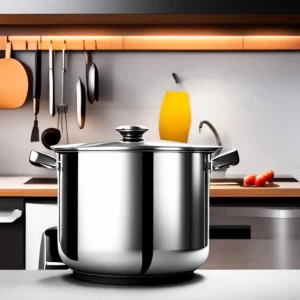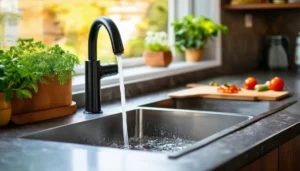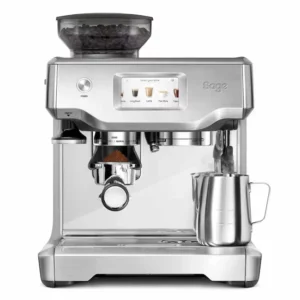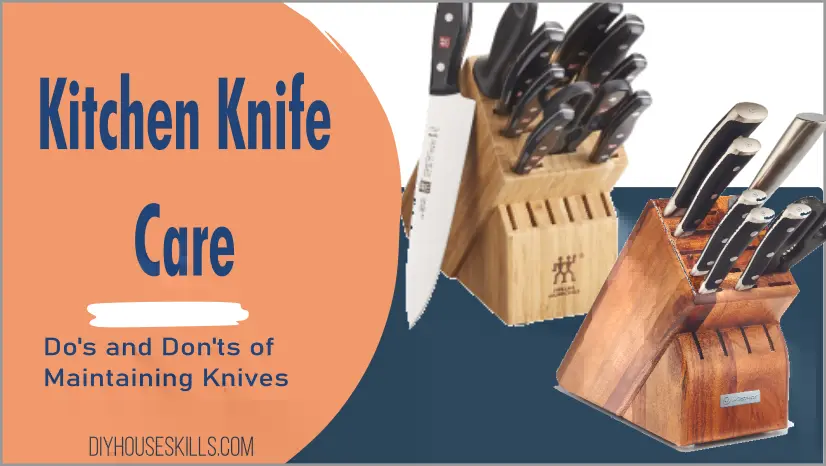Kitchen knives are one of the most important tools in the kitchen. However, improper care can lead to dull and damaged knives.
In this article, we will discuss the do’s and don’ts of kitchen knife care. We’ll cover everything from storing your knives to sharpening them properly.
Follow these tips, and you’ll be able to keep your knives in great condition for years to come!
Let’s get started.
And be sure to check out my article – Kitchen Knife Anatomy: Metal Material and Composition, and find out if an undercounter refrigerator or an indoor smokeless grill is worth it too. Or just want some general maintenance guides, I’ve got you covered with my other articles.
- Tips for taking care of your kitchen knives:
- Why it is important to care for your kitchen knife properly
- What type of knives should I be looking for?
- How do you sharpen kitchen knives?
- How to properly store kitchen knives?
- Most common mistakes people make when taking care of their kitchen knives that often end up damaging them or making them duller than they were intended to be?
- Kitchen knife care – Summary
THIS POST MAY CONTAIN AFFILIATE LINKS. As an Amazon Associate, I earn from qualifying purchases. PLEASE READ MY DISCLOSURE FOR MORE INFO.
Tips for taking care of your kitchen knives:
Follow these Do’s and Don’ts of proper kitchen knife care to learn what you need to do to properly take care of your kitchen knives
The Do’s of Kitchen Knife Care:
- Always wash kitchen knives by hand. Do not put them in the dishwasher.
- Use gentle dish soap and warm water to clean the blades.
- Towel dry the blades after washing. Make sure they are completely dry before storing. Wet knives can rust, and dirty blades can lead to bacteria growth.
- Sharpen kitchen knives on a regular basis using a sharpening stone or honing rod. A sharp blade is safer and easier to use than a dull one.
- Do store your kitchen knives in a safe place. Knives should be stored in a drawer or knife block, where they will be protected from being damaged or dulled.
Tip: Store kitchen knives in a safe place where they will not be accessible to children
The Don’ts of Kitchen Knife Care:
- Don’t use kitchen knives for anything other than their intended purpose.
- Don’t leave kitchen knives lying around the kitchen.
- Don’t put kitchen knives in the dishwasher. The harsh chemicals and high temperatures can damage the blades.
- Do not use kitchen knives to cut hard materials like bones, frozen food, or thick-skinned fruits and vegetables.
Why it is important to care for your kitchen knife properly
Kitchen knives are one of the most important tools in the kitchen. They can be used for a variety of tasks, such as cutting meat, vegetables, and fruits. However, improper care can lead to dull and damaged knives.
If you let them get dull, you may discover that they are not as effective at cutting through food as they once were.
In addition, kitchen knives that are not properly cared for can become rusty and covered in bacteria.
Related: Complete Guide To Cutting Boards
What are some common tasks that can damage kitchen knives?
A kitchen knife is usually made of steel, so it can corrode or rust when exposed to water. A kitchen knife should not be left in soaking wet conditions, even for a short time. Soapy residue from cleaning kitchen knives may also lead to bacteria growth and cause problems with corrosion and dullening.
It’s important to keep kitchen knives stored in a protected area like a knife guard or knife block, away from harsh chemicals and elements such as oxygen and water (to prevent food residue on the blades).
How to safely dry a kitchen knife
If you have just washed kitchen knives, it is important to dry them with a dry cloth. Make sure that the kitchen knives are completely dry before you store them.
To dry a kitchen knife, take a dry cloth and gently wipe the blade. Make sure that you do not use any harsh chemicals to clean kitchen knives, as this can damage the blades.
How often should kitchen knives be sharpened?
It is important to sharpen kitchen knives on a regular basis in order to keep them functioning properly. The best time to sharpen kitchen knives is when they start to feel dull.
This will vary depending on how often you use it, but about every 4 uses of the knife.
What type of knives should I be looking for?
When looking for kitchen knives, it is important to find a quality set that will last. There are many different types of kitchen knives available on the market, so it can be difficult to know which ones are best.
Here are some tips for choosing kitchen knives:
- Look for a set that includes a variety of knives, such as a chef’s knife, paring knife, and serrated knife.
- Choose kitchen knives made from high-quality materials, such as stainless steel or carbon steel.
- Make sure the kitchen knives are well-balanced and comfortable to hold.
If you’re looking for a good set of kitchen knives, we recommend the following:
- The Wusthof Classic Ikon Knife Set includes a variety of knives made from high-quality materials.
- The Victorinox Fibrox Pro Chef’s Knife Set is a good option for those on a budget. It includes a chef’s knife, paring knife, and serrated knife.
- The Zwilling J.A. Henckels Twin Signature Knife Set is a popular choice, thanks to its high-quality construction and comfortable design.
How do you sharpen kitchen knives?
What is the proper way to sharpen kitchen knives?
There are a few different ways to sharpen kitchen knives. You can use a sharpening stone, honing rod, or electric sharpener.
1. How do you use a sharpening stone?
A sharpening stone is a diamond or whetstone that is used to sharpen kitchen knives. To use a sharpening stone, you will need to soak it in water for 10-15 minutes. Then, hold the knife at a 20-degree angle and run the blade along the stone. Repeat this process on both sides of the blade.
2. How do you use a honing rod?
A honing rod is a metal or ceramic rod that is used to hone kitchen knives. To use a honing rod, hold it at a 20-degree angle and run the blade along it. Repeat this process on both sides of the blade. Honing rods are not as effective at sharpening kitchen knives as sharpening stones.
3. How do you use an electric sharpener?
An electric sharpener is a device that uses spinning blades to sharpen kitchen knives. To use an electric sharpener, place the knife in the slot and pull it towards you several times. Be careful not to apply too much pressure, or you could damage the blade.
Is there a difference between sharpening kitchen and outdoor knives?
Kitchen knives are designed to cut through softer materials like vegetables, fruits, and poultry. Outdoor knives are designed for tougher tasks such as cutting into bone or wood.
Kitchen knives are not typically used to do the kind of heavy-duty cutting that outdoor knives are made for.
Kitchen knives are made from a softer steel grade than outdoor knives, so they can be sharpened easier and will not hold an edge as long. Kitchen knives also have a finer edge than outdoor knives, which makes them better suited for delicate tasks like slicing tomatoes.
How to properly store kitchen knives?
Where you store your kitchen knives is just as important as how you take care of them. Do not store kitchen knives in a drawer with other utensils, as they will get scratched or damaged.
Kitchen knives should be stored in a dry, protected area where they will be safe from harsh chemicals and elements.
Some people choose to store kitchen knives in a knife guard, while others opt for a knife block.
Whichever storage solution you choose, make sure the knives are always clean and dry before putting them away.
Most common mistakes people make when taking care of their kitchen knives that often end up damaging them or making them duller than they were intended to be?
There are a few common mistakes that people make when taking care of kitchen knives:
- Not cleaning the knives after each use. This can cause food residue to build up on the blades, which can dull the knife’s edge over time.
- Not sharpening the knives regularly. This can also cause the knife’s edge to become dull over time.
- Trying to cut through harder materials than the knife is designed for. Kitchen knives are not meant for heavy-duty cutting like outdoor knives are, and trying to do so can damage the blade.
Kitchen knife care – Summary
Kitchen knives are an essential tool in any kitchen. By following these simple tips, you can keep your kitchen knives in good condition and ensure years of safe, effective use.
- DIY Secrets: Finding and Using the Bosch Ice Maker Reset Button

- Say Goodbye to Stubborn Stains on Stainless Steel Pots

- Effortlessly Remove Mold From Tile Grout with These Easy Steps

- Proven Strategies to Unclog Your Kitchen Sink Efficiently

- Outlet Not Working, Breaker Not Tripped | Advice

- How to Repair a Sage Coffee Machine


